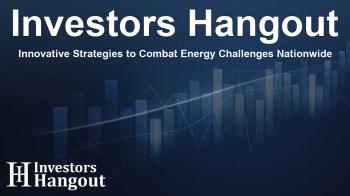Innovative Strategies to Combat Energy Challenges Nationwide

Innovative Solutions for Energy Demand Challenges
Distributed energy resources ensure grid reliability amid challenges
Amid record-high temperatures causing strain on the electric grid in various parts of the country, lawmakers met to discuss innovative solutions for rising energy demands. During a two-day conference, elected officials from multiple states gathered to explore ways to ensure reliability and affordability in energy supply.
Understanding the Pressing Needs
This meeting was sponsored by a leading charitable organization focused on energy modernization, in collaboration with legislative bodies dedicated to energy solutions. The discussions zeroed in on distributed energy resources (DERs), which empower businesses and communities to not just consume but also generate and store their energy. This capability allows users to reduce their dependence on local utility companies and even sell surplus energy back to the grid.
Bipartisan Approaches to Energy Policy
Among the attendees was a passionate state representative known for his extensive experience in the energy sector. He highlighted the critical need for a multifaceted approach to meet energy demands effectively. Representatives from 12 states participated in a tour of a facility showcasing modern energy technologies, particularly focusing on systems that facilitate energy generation closer to consumption sites.
Touring Advanced Energy Solutions
During the tour, lawmakers observed a cutting-edge battery storage system, operated by a local utility company, which captures solar energy and redistributes it during peak demand. This innovative method aims to provide a balanced energy supply, particularly during high-demand periods.
Increasing Adoption of DERs
The assembly provided a platform for lawmakers to converse about strategies that might encourage more widespread adoption of DERs. One legislator from a bustling city expressed her constituents' urgent desire for renewable energy options. She recognized the proactive steps being taken in her state and expressed determination to enhance those initiatives.
Benefits of DERs for Community Resilience
Experts in distributed energy resources illustrated how these technologies can satisfy growing electricity needs without necessitating the construction of large, costly power plants. Microgrids, a component of DERs, can independently provide power and support essential services during grid outages, particularly following severe weather events. Some officials are considering implementing these systems to bolster economic growth and attract new industries to their regions.
Economic and Security Implications
In one representative's district, a dense concentration of data centers generates substantial tax revenue and funds local education systems. He emphasized the importance of ensuring a stable energy supply to sustain this economic benefit. Another senator discussed how investing in distributed energy resources could enhance national security while promoting job creation in his state.
Addressing Energy Cost Concerns
Concerns regarding energy affordability were voiced by various lawmakers, especially for communities where many residents are on fixed incomes. They shared local examples illustrating the pressing need for sustainable energy solutions to avoid an energy crisis.
A Global Perspective on DERs
Highlighting international models, leaders noted that some countries are successfully incorporating DERs into their energy strategies. Comparatively, Australia's achievements in this area present potential pathways for the U.S. to follow, given the looming challenges of rising energy costs and demand.
The Next Steps Forward
Looking ahead, a comprehensive policy framework to facilitate DERs will be developed based on insights gathered during this session. Plans include producing a playbook to assist various stakeholders in harnessing the benefits of distributed energy resources. The goal is a more resilient and affordable energy future for all.
Frequently Asked Questions
What are distributed energy resources (DERs)?
DERs are technologies that enable the generation and storage of energy by consumers, businesses, and communities, allowing for greater energy independence and efficiency.
Why are lawmakers focusing on DERs?
Lawmakers recognize the necessity of innovative energy solutions to meet growing demands and enhance grid reliability, particularly in light of extreme weather changes.
How do DERs contribute to economic development?
By enabling local power generation and potentially attracting new industries, DERs can significantly boost local economies and job markets, enriching community infrastructures.
What examples from other countries illustrate successful DER implementation?
Countries like Australia showcase effective integration of DERs in their energy systems, achieving a higher percentage of energy needs being met through these technologies compared to the U.S.
What future steps are planned regarding DER policies?
A forthcoming policy playbook is being developed to provide guidelines for states and stakeholders on optimizing the use and implementation of DERs to foster a more stable energy landscape.
About The Author
Contact Lucas Young privately here. Or send an email with ATTN: Lucas Young as the subject to contact@investorshangout.com.
About Investors Hangout
Investors Hangout is a leading online stock forum for financial discussion and learning, offering a wide range of free tools and resources. It draws in traders of all levels, who exchange market knowledge, investigate trading tactics, and keep an eye on industry developments in real time. Featuring financial articles, stock message boards, quotes, charts, company profiles, and live news updates. Through cooperative learning and a wealth of informational resources, it helps users from novices creating their first portfolios to experts honing their techniques. Join Investors Hangout today: https://investorshangout.com/
The content of this article is based on factual, publicly available information and does not represent legal, financial, or investment advice. Investors Hangout does not offer financial advice, and the author is not a licensed financial advisor. Consult a qualified advisor before making any financial or investment decisions based on this article. This article should not be considered advice to purchase, sell, or hold any securities or other investments. If any of the material provided here is inaccurate, please contact us for corrections.

